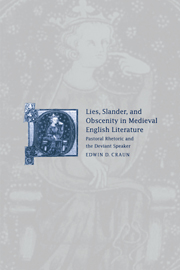 Lies, Slander and Obscenity in Medieval English Literature
Lies, Slander and Obscenity in Medieval English Literature Published online by Cambridge University Press: 31 October 2009
Early in the fourteenth century, the English priest Robert Mannyng wrote down in his catechetical manual Handlyng Synne the story of a woman who cursed her daughter. As she was preparing to bathe in open country, she gave the child her clothes, bidding her to bring them as soon as she called. When she finished bathing and the child failed to come at her first call, she, “ful of yre and of wraþ,” cursed her child with “þe deuyl come on þe, / For þou art not redy to me.” The devil immediately claimed the child þat þou me betaghte [yielded] wyþ euyl,” manifesting his possession by maddening her on the spot. The literal sense of the woman's words and the malicious fury which generated them gave the devil lifelong power over her child, who, in turn, was given a diabolical power of speech: she exposed the secret sins of everyone whom she encountered.
For Mannyng, the woman's utterance is more than an instance of what J. L. Austin and John Searle would call the performative, of language which does something in the saying, as excommunication was sometimes believed to do. Mannyng's presentation of her speech shares with the speech act theorist interest in utterances as social acts, but it also manifests the late medieval discursive practice, to which priests were especially given, of examining utterances in ethical terms. What does a speaker will?
To save this book to your Kindle, first ensure [email protected] is added to your Approved Personal Document E-mail List under your Personal Document Settings on the Manage Your Content and Devices page of your Amazon account. Then enter the ‘name’ part of your Kindle email address below. Find out more about saving to your Kindle.
Note you can select to save to either the @free.kindle.com or @kindle.com variations. ‘@free.kindle.com’ emails are free but can only be saved to your device when it is connected to wi-fi. ‘@kindle.com’ emails can be delivered even when you are not connected to wi-fi, but note that service fees apply.
Find out more about the Kindle Personal Document Service.
To save content items to your account, please confirm that you agree to abide by our usage policies. If this is the first time you use this feature, you will be asked to authorise Cambridge Core to connect with your account. Find out more about saving content to Dropbox.
To save content items to your account, please confirm that you agree to abide by our usage policies. If this is the first time you use this feature, you will be asked to authorise Cambridge Core to connect with your account. Find out more about saving content to Google Drive.